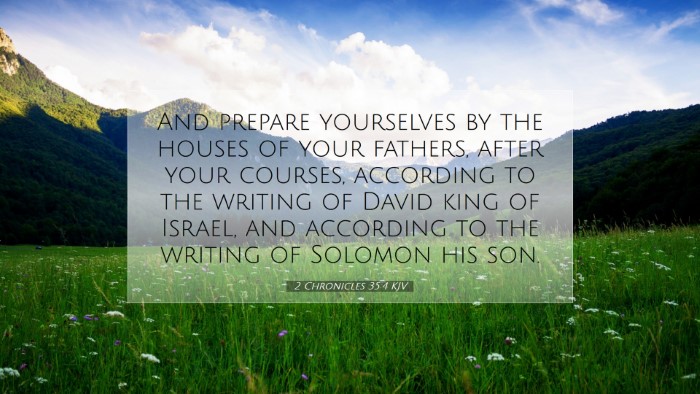Commentary on 2 Chronicles 35:4
Verse: "And prepare yourselves by the houses of your fathers, after your courses, according to the writing of David king of Israel, and according to the vision of Nathan the prophet." - 2 Chronicles 35:4
Introduction
This verse captures a pivotal moment in the religious life of Judah under King Josiah. It reveals the preparation necessary for observing the Passover and reinstating the worship of Yahweh in accordance with the ancient traditions established by their forefathers. The insights from respected public domain commentators help illuminate the thematic and historical significance of the verse.
Contextual Overview
The account in 2 Chronicles 35 takes place during the latter part of King Josiah's reign, a time marked by religious reform and a passionate return to the covenantal practices of Israel. Josiah’s reforms followed the rediscovery of the Book of the Law, which had catalyzed a national revival. This preparation for the Passover outlined in this verse emphasizes not just the reinstatement of tradition but also the necessity of proper spiritual readiness.
Exegesis of the Text
1. Preparing for Worship:
Matthew Henry highlights the importance of preparation in worship, indicating that the command to “prepare yourselves” reflects a call to personal sanctification and communal responsibility. Just as the Israelites needed to consecrate themselves before the Passover, modern believers are encouraged to approach God with a heart attuned to reverence and cleansing.
2. The Role of Heritage:
Albert Barnes notes that the mention of “the houses of your fathers” signifies an appeal to the historical and familial connections to faith. This aspect suggests that worship is not only an individual endeavor but also one deeply rooted in community and tradition. The collective memory and practices of prior generations serve as a foundation upon which subsequent worship is built.
3. Following Divine Instructions:
Adam Clarke points out that adherence to the instructions “according to the writing of David” and “the vision of Nathan” underscores the precedence of divine revelation over personal innovation. The reference to David illustrates the importance of historical fidelity to God’s commands, stressing that worship should follow the guidelines laid out by those who were faithful to God's message.
Theological Implications
- Holiness and Preparation: The verse speaks to the need for holiness in worship. As seen in the preparations for the Passover, spiritual readiness is essential for encountering the Holy God.
- Generational Faith: The emphasis on preparing according to the lineage of forebears suggests that faith is not merely personal but communal and generational, bridging the gap between past and present.
- Authority of Scripture: By referencing the writings of historical figures, the text affirms the authority and significance of Scripture as a guiding principle for worship practices.
Practical Applications
For pastors and church leaders, this verse serves as a reminder of the need for intentional preparation in worship services. This preparation should extend beyond logistical arrangements to include spiritual and communal readiness. It encourages congregations to reflect on their heritage and how the faith practices of previous generations can inform and enrich their worship experience today.
For theological scholars and students, the verse prompts further questions about the interplay between historical context and contemporary worship practices. It invites exploration of the ways in which individual and communal identities are shaped by historical narratives and divine commandments.
Conclusion
In summation, 2 Chronicles 35:4 serves as a profound exhortation for believers to engage in worship with full awareness of their spiritual heritage, to prepare their hearts and lives, and to adhere strictly to the principles established by God. The insights from Matthew Henry, Albert Barnes, and Adam Clarke reveal rich layers of meaning that encourage believers to take worship seriously and to recognize the weight of their historical faith context.


